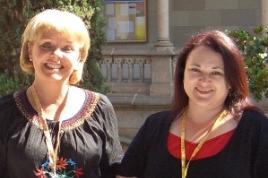Impaired decision-making study a logical step for 'Students in Custody' researchers
Published on 01 December, 2009
A study into how Indigenous Queenslanders are assessed with having impaired decision making capacity is a logical step for researchers who have been awarded for studying education journeys of Indigenous students in custody.
"Everything is connected so of course you'll have people with impaired decision making capacity in prisons and maybe they're in prison because of that ...we suspect we are going to uncover lots of areas needing further research," said CQUniversity's Vicki Pascoe, who teamed with Kylie Radel on the 'Students in custody' report.
‘Students in custody' report a world beater
The pair are now working alongside colleagues at Griffith and James Cook universities to explore whether legislation relating to impaired decision making capacity adequately accounts for Indigenous experiences.*
Vicki Pascoe (left) and Kylie Radel
"The first step is to ask the question 'how do Indigenous families and communities make decisions on behalf of their families and communities?' ... our pilot study is to look at how people make decisions in such instances and from there look at a definition for what is impaired decision making capacity and what the legislation can do to help people make decisions in a more formalised structure," Kylie said.
The CQUniversity pair were among participants in this month's (Nov 26) Indigenous Research Showcase hosted by Nulloo Yumbah, CQUniversity's Indigenous Learning, Spirituality and Research Centre.
Showcase participants discussed the need to enable and hear the 'voice' of Indigenous people, working within their own terms of reference and maintaining the integrity of their world view.
Kylie said the forum was able to present the breadth of current and potential research connected to Nulloo Yumbah.
"The Nulloo Yumbah role is perceived as student support but it is a research and teaching centre too," she said.
"We hope other organisations can think about Nulloo Yumbah as a place to get this sort of information found, such as the impaired decision making capacity relating to Indigenous people.
"We have a research methodology so that the Indigenous voice is presented centre stage rather than a typical western methodology which might put the voice somewhat distant to the research provision.
Vicki said the forum was a grounding experience which forced her to stop and reflect on how everything is interconnected "and how we still need to be very careful how we do our research with Indigenous people".
"Vital things like valuing the voice and really hearing the voice are all connected and there are all the issues that influence whether someone is going to be incarcerated or not ... those things are interlinked so it's a very holistic experience".
Vicki spoke about the challenges of completing a course of study while in prison.
"Prison culture dominates, people have to somehow find their study time. Prison core programs are prioritised and students studying our entry program can be taken out at almost no notice to attend a core program; and that could be when all the assessment is due ... it's a real challenge," she said.
"It's not easy to do research in prison. The protocols and ethical clearances are extensive.
"Even though we were already going in as teachers, we had to virtually start again as researchers and it took 12 months to get in there but that really drove us towards the student voice, because we had mentioned we might be doing research and the students couldn't wait to talk to us."
* The views expressed in this interview are the views of the Researchers and do not necessarily reflect the views of the State of Queensland, Australia

